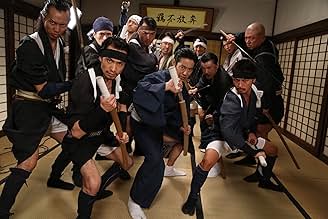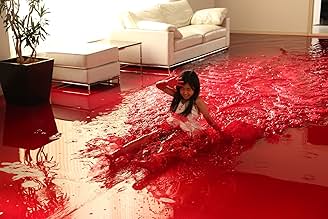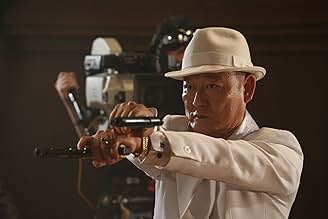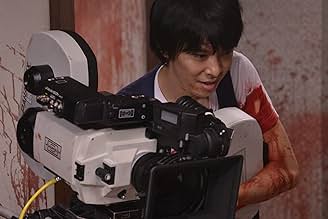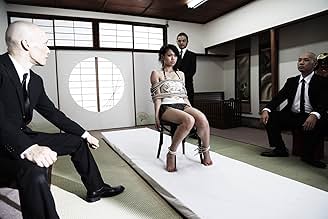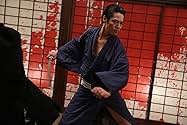VALUTAZIONE IMDb
7,1/10
9395
LA TUA VALUTAZIONE
Un gruppo di giovani che sognano di entrare nel mondo del cinema realizzando un film hanno l'opportunità di mettersi alla prova filmando la faida tra due clan della yakuza.Un gruppo di giovani che sognano di entrare nel mondo del cinema realizzando un film hanno l'opportunità di mettersi alla prova filmando la faida tra due clan della yakuza.Un gruppo di giovani che sognano di entrare nel mondo del cinema realizzando un film hanno l'opportunità di mettersi alla prova filmando la faida tra due clan della yakuza.
- Regia
- Sceneggiatura
- Star
- Premi
- 8 vittorie e 11 candidature totali
Recensioni in evidenza
Shion Sono, one of Japan's contemporary cult directors, makes a follow-up to cinephile hits like Suicide Club, Noriko's Dinner Table, Strange Circus, Hair Extensions, Love Exposure, Coldfish and Himizu. After The Land of Hope, his idiosyncratic sci-fi drama shot around the Fukushima disaster, the transgressive Sono makes another instant cult hit with Why Don't You Play in Hell? This definitely won't appeal to a mainstream audience and to be honest, at first I had quite some difficulties watching it myself. It all seems a bit over the top and because of that it felt amateuristic. On the other hand I suppose this is the authentic style Sono is known for. With some patience I endured the first half an hour. Once I got familiar with its peculiarities, irony, meta-references and subversive character, this film started to grow on me. Especially the part of the young movie team that has been procrastinating their film project for years; while this is more of a sideline to the story, Why Don't You Play in Hell? depends on it for its absurd climax. The only thing I couldn't get into was the over-the-top acting. Cool movie with a high DIY vibe, although not flawless.
I watched this movie few days ago and it is the first Sono Sion movie I have ever watched in cinema. The movie is quite funny with bloody scenes and mad characters (especially the film producer/director played by Hiroki Hasegawa) as Sono always does. You can say that the theme is actually about 35mm film and enthusiasm towards filmmaking (or in general pursuing dream). The thing that touches me (as non film geek) is that film encourage audience to get crazy for our dreams and wild out for it (I think at this point is quite similar to Love Exposure). I would recommend this movie to film lovers but in my viewpoint, this probably cannot really come close to Love Exposure.
7sol-
Fate causes the paths of a guerrilla film crew and two feuding Yakuza clans to clash for the second time in ten years in this outlandish comedy from 'Suicide Club' director Sion Sono. The movie initially feels like a twisted version of 'Bowfinger' or 'Cecil B. DeMented' as the young guerrilla filmmakers heartlessly intrude on the Yakuza madness to get money shots. In between the violence, there are also some moments of macabre beauty too, such as a young girl in a white dress sliding through a sea of blood, and things get more complex as the story progresses and jumps to the present. Deliciously weird and wacky as the film is, it takes a long time for the paths of the protagonists to cross once again, and the film feels way too long. It is, however, the midsection that needs trimming (especially a romance) as the carnage-heavy finale is glorious with the guerrillas' insensitivity to all the bloodshed at peak. The unemotional way in which they film all the action is uncanny; one gets a sense that they have completely lost all sense of distinction between reality and movie-making. The film has some solid performances too, particularly from Jun Kunimura as a much-feared Yakuza boss whose daughter used to be in toothpaste commercials, and Shinichi Tsutsumi as the other Yakuza boss who became fixated on Kunimura's little girl at an age that many would consider creepy. Fumi Nikaidou (as the adult daughter) also keeps singing her toothpaste jingle. It is that kind of delirious, unconventional comedy if one is in the mood for something decidedly different.
Tokyo gore with a hit of influence from Guy Richie.
It was the perfect midnight movie with such an over the top cartoonish violence about an Amateur filmmaker who stumbles upon the opportunity of a life time (or as he sees it, a gift from the film God) when a young man needs his help in making a movie after getting caught up with a Yakuza boss' daughter.
A series of events with a large ensemble cast that wove together perfectly.
This movie was strange but so entertaining I did not stop smiling throughout the whole thing
It was the perfect midnight movie with such an over the top cartoonish violence about an Amateur filmmaker who stumbles upon the opportunity of a life time (or as he sees it, a gift from the film God) when a young man needs his help in making a movie after getting caught up with a Yakuza boss' daughter.
A series of events with a large ensemble cast that wove together perfectly.
This movie was strange but so entertaining I did not stop smiling throughout the whole thing
Nutty yakuza comedy from Sion Sono. It's overlong, particularly with an interminable set-up, but once we get to the big action set piece you'll find it well worth the wait. A group of amateur filmmakers calling themselves the F Bombers (led by Hiroki Hasegawa) has spent a decade looking for the opportunity to make a real movie. Fortunately (or unfortunately) for them, a yakuza gang is looking for someone to make a feature starring the boss's daughter (Jun Kunimura is the boss, Fumi Nikaido the daughter). Hasegawa proposes that they film the real-life gang war that is bound to happen with the rival gang (led by Shin'ichi Tsutsumi). Sono really could have shortened the film considerably had he realized the character played by Gen Hoshino, the love interest of Nikaido, was worthless and jettisoned him. Or, more obviously, he should have been combined with Hasegawa's character. As it is, Hoshino plays a shy, ineffectual character and he pretty much gets shoved to the background anytime the more lively Hasegawa is on screen. I can't imagine anyone caring about his burgeoning relationship with the drop-dead gorgeous Nikaido. None of this really matters once we get to the blood-soaked finale, which is about as fun as any movie I've seen in recent memory.
Lo sapevi?
- QuizThe main characters who are amateur filmmakers watch a trailer they have made for their own film called "The Blood of Wolves", though they haven't actually made the movie itself yet, and never do. That was the working title of a movie later called Kenkichi (2012), that Sion Sono and Tak Sakaguchi were working on around the same time as this film. That film Kenkichi was also never made.
- ConnessioniFeatured in Horror's Greatest: Japanese Horror (2024)
- Colonne sonoreConcerto Pour Une Voix
By Saint-Preux
I più visti
Accedi per valutare e creare un elenco di titoli salvati per ottenere consigli personalizzati
- How long is Why Don't You Play in Hell??Powered by Alexa
Dettagli
Botteghino
- Lordo Stati Uniti e Canada
- 28.534 USD
- Fine settimana di apertura Stati Uniti e Canada
- 5060 USD
- 9 nov 2014
- Lordo in tutto il mondo
- 1.265.872 USD
- Tempo di esecuzione
- 2h 9min(129 min)
- Colore
- Mix di suoni
- Proporzioni
- 2.35 : 1
Contribuisci a questa pagina
Suggerisci una modifica o aggiungi i contenuti mancanti


